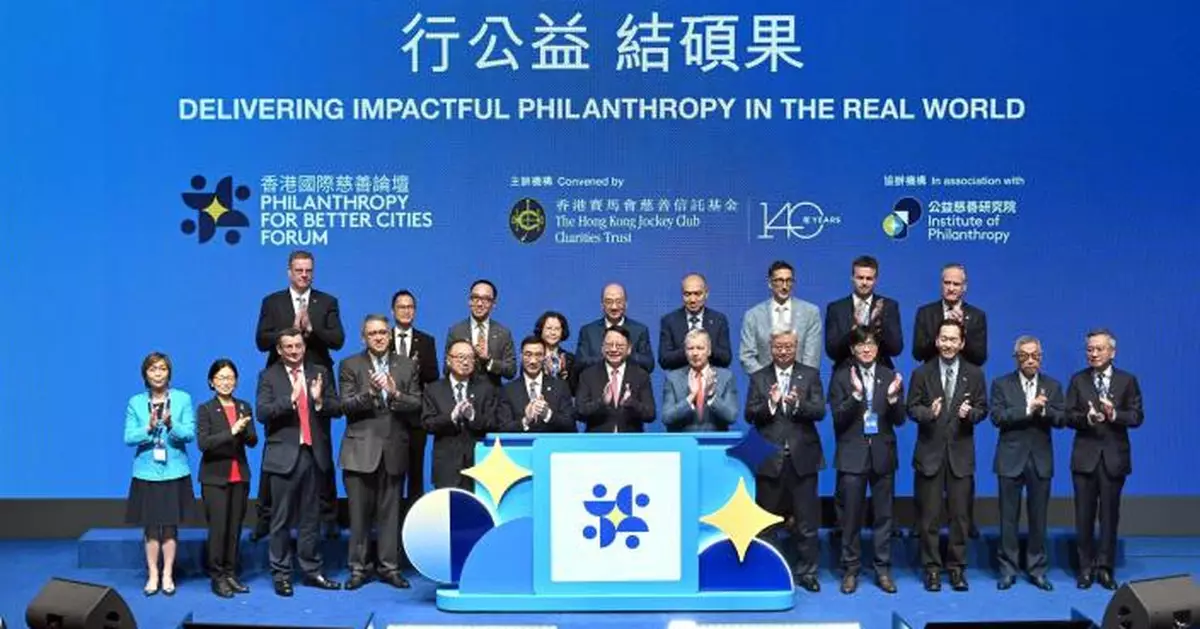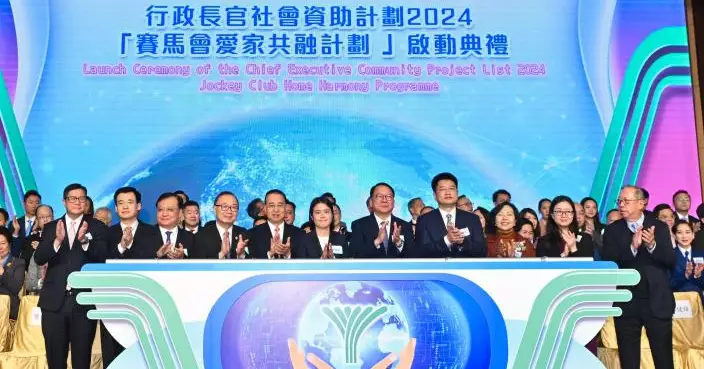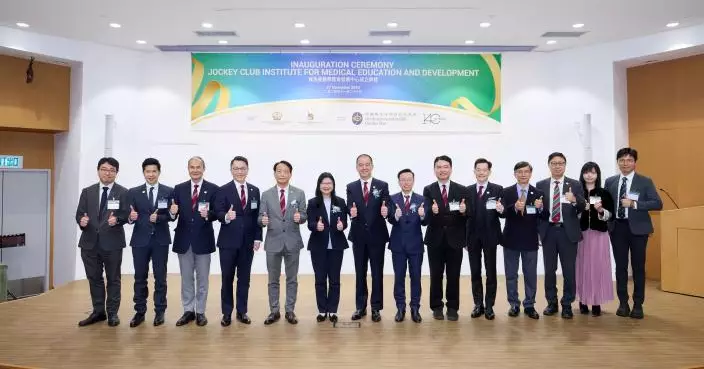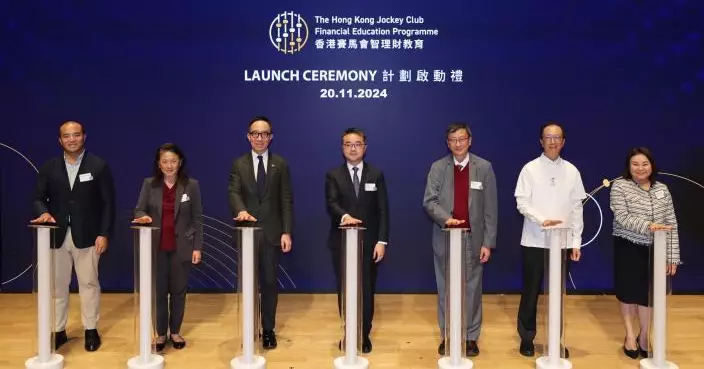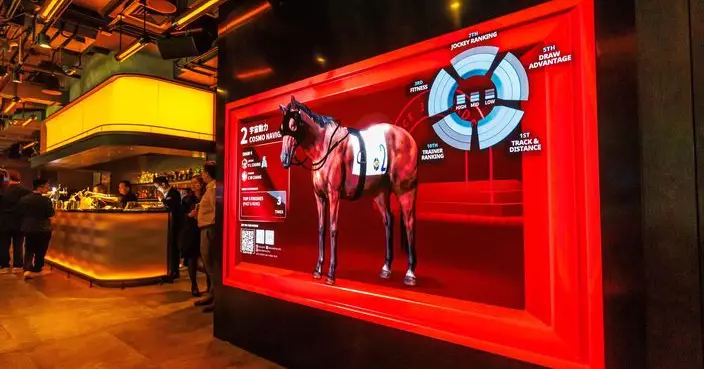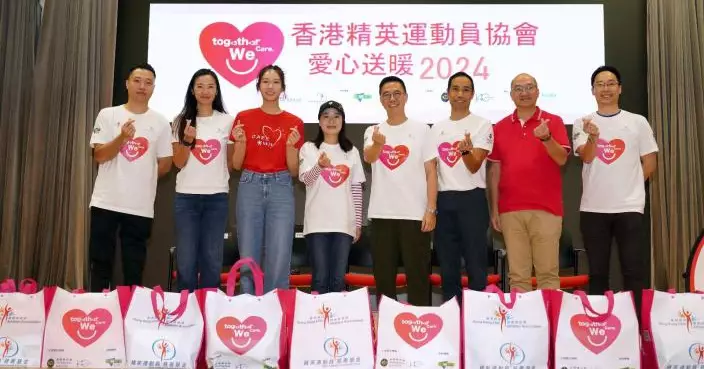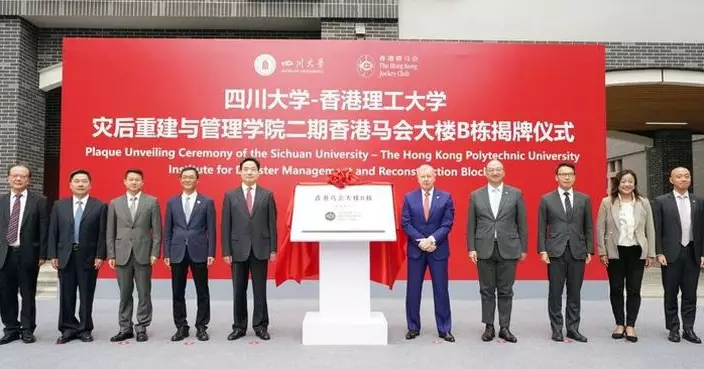The Hong Kong Jockey Club Charities Trust convened its fourth Philanthropy for Better Cities (PBC) Forum 2024 at West Kowloon Cultural District today (9 September). It ushered in Hong Kong Philanthropy Week, in keeping with the HKSAR Government’s mission to promote the city as an international philanthropy hub.
The two-day PBC Forum provides a platform for foundations, thought-leaders, policymakers, non-governmental organisations and experts from around the world to convene, engage in dialogue and share transformative ideas on translating philanthropic action into tangible, sustainable impact. Under an overarching theme of “Delivering Impactful Philanthropy in the Real World”, the forum features keynote speeches and panel discussions. It brings together nearly 100 eminent speakers and more than 2,000 delegates from 40 countries and regions including representatives of over 200 local, regional and global foundations.
Click to Gallery
The Memorandum of Collaboration was signed by Li Qun, Deputy Director General, Chinese Center for Disease Control and Prevention (front row, 2nd right); Prof Chak-sing Lau, Dean of Medicine, The University of Hong Kong (front row, 2nd left); Prof Philip Chiu Wai-yan, Dean of Medicine, The Chinese University of Hong Kong (front row, 1st right); and Prof Vanessa Barrs, Dean, Jockey Club College of Veterinary Medicine and Life Sciences, City University of Hong Kong (front row, 1st left). The signing ceremony was witnessed by Michael Lee,Chairman of The Hong Kong Jockey Club (back row, 2nd right); Lester Huang, Chairman of IoP and Steward of The Hong Kong Jockey Club (back row, 1st left); Winfried Engelbrecht Bresges, CEO of The Hong Kong Jockey Club and Director of IoP (back row, 1st right); and Dr Ronald Lam, Director of Health, HKSAR Government (back row, 2nd left).
Launching a new, systematic assessment of Asian giving”, Ichiro Kabasawa, Executive Director of The Nippon Foundation (1st left), Benny Lee, CEO of the Tanoto Foundation (2nd left), and Jennifer Stout, Deputy Director of the Bill & Melinda Gates Foundation (2nd right), explore the potential of new assessment tools to define and ensure philanthropic impact. The session was moderated by William Foster, Managing Partner of the Bridgespan Group (1st right). Jagannatha Kumar, Chief Executive Officer of Reliance Foundation, and Mattie Bekink, China Regional Director of the Ford Foundation, also participated in the discussion via video conferencing.
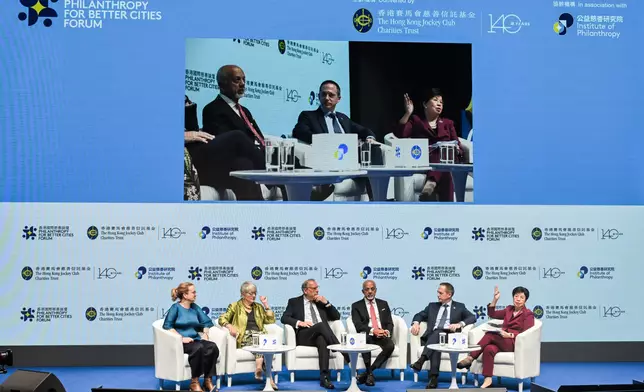
In the first plenary session entitled “What is Impact? The second plenary session entitled “Innovations for a Healthier Global South: What is the role of philanthropy in supporting global health research and interventions?” was moderated by Professor Margaret Chan, Founding Dean of the Vanke School of Public Health, Tsinghua University, and Emeritus Director General of World Health Organization (1st right). It featured Rebecca F. Grais, Executive Director of the Pasteur Network (1st left); Ilona Kickbusch, Director of Digital Health Transformations LAB, University of Geneva, Chair and Founder of the Global Health Center Geneva at the Graduate Institute Geneva and Co-chair of the Council of the World Health Summit (2nd left); Professor Peter Piot, Professor of Global Health, London School of Hygiene & Tropical Medicine, Special Advisor to European Commission President von der Leyen on European and Global Health Security (3rd left); Naveen Rao, Senior Vice-President of the Health Initiative at the Rockefeller Foundation (3rd right); and Carsten Schicker, Chief Executive Officer of the World Health Summit (2nd right).
HKSAR Government Chief Secretary for Administration Chan Kwok-ki (front row, centre), Club Chairman Michael Lee (front row, 6th left), Club Deputy Chairman Martin Liao (front row, 5th left), Club Stewards, Club CEO Winfried Engelbrecht-Bresges (front row, 6th right) and Club management pose for a group photo at the opening ceremony of the Philanthropy for Better Cities Forum 2024.
HKSAR Chief Executive John Lee delivers a video address at the opening ceremony of the Philanthropy for Better Cities Forum 2024.
Club Chairman Michael Lee delivers a speech at the opening ceremony of the Philanthropy for Better Cities Forum 2024.
Moderated by Laura M. Cha, Trustee of the Rockefeller Foundation, Former Chairman of Hong Kong Exchanges and Clearing Ltd (left), Julia Gillard, Chair of the Wellcome Trust, Chair of the Global Institute for Women’s Leadership and former Prime Minister of Australia, (right) delivered the opening keynote: “East is East and West is West: how does philanthropy differ and how can we best work together?”
Delivering the second keynote entitled “The Economics of Giving: What makes us give? What stops us from giving more?” was Professor Michael Spence, 2001 Nobel Laureate in Economics, Philip H. Knight Professor and Dean Emeritus of the Stanford Business School and Senior Fellow, Hoover Institution of Stanford University (left). The moderator was Professor Stephen Cheung, Voting Member of The Hong Kong Jockey Club, Vice-Chairman of CMB Wing Lung Bank and Former President of the Education University of Hong Kong (right).
The Memorandum of Collaboration was signed by Li Qun, Deputy Director General, Chinese Center for Disease Control and Prevention (front row, 2nd right); Prof Chak-sing Lau, Dean of Medicine, The University of Hong Kong (front row, 2nd left); Prof Philip Chiu Wai-yan, Dean of Medicine, The Chinese University of Hong Kong (front row, 1st right); and Prof Vanessa Barrs, Dean, Jockey Club College of Veterinary Medicine and Life Sciences, City University of Hong Kong (front row, 1st left). The signing ceremony was witnessed by Michael Lee,Chairman of The Hong Kong Jockey Club (back row, 2nd right); Lester Huang, Chairman of IoP and Steward of The Hong Kong Jockey Club (back row, 1st left); Winfried Engelbrecht Bresges, CEO of The Hong Kong Jockey Club and Director of IoP (back row, 1st right); and Dr Ronald Lam, Director of Health, HKSAR Government (back row, 2nd left).
Launching a new, systematic assessment of Asian giving”, Ichiro Kabasawa, Executive Director of The Nippon Foundation (1st left), Benny Lee, CEO of the Tanoto Foundation (2nd left), and Jennifer Stout, Deputy Director of the Bill & Melinda Gates Foundation (2nd right), explore the potential of new assessment tools to define and ensure philanthropic impact. The session was moderated by William Foster, Managing Partner of the Bridgespan Group (1st right). Jagannatha Kumar, Chief Executive Officer of Reliance Foundation, and Mattie Bekink, China Regional Director of the Ford Foundation, also participated in the discussion via video conferencing.

In the first plenary session entitled “What is Impact? The second plenary session entitled “Innovations for a Healthier Global South: What is the role of philanthropy in supporting global health research and interventions?” was moderated by Professor Margaret Chan, Founding Dean of the Vanke School of Public Health, Tsinghua University, and Emeritus Director General of World Health Organization (1st right). It featured Rebecca F. Grais, Executive Director of the Pasteur Network (1st left); Ilona Kickbusch, Director of Digital Health Transformations LAB, University of Geneva, Chair and Founder of the Global Health Center Geneva at the Graduate Institute Geneva and Co-chair of the Council of the World Health Summit (2nd left); Professor Peter Piot, Professor of Global Health, London School of Hygiene & Tropical Medicine, Special Advisor to European Commission President von der Leyen on European and Global Health Security (3rd left); Naveen Rao, Senior Vice-President of the Health Initiative at the Rockefeller Foundation (3rd right); and Carsten Schicker, Chief Executive Officer of the World Health Summit (2nd right).
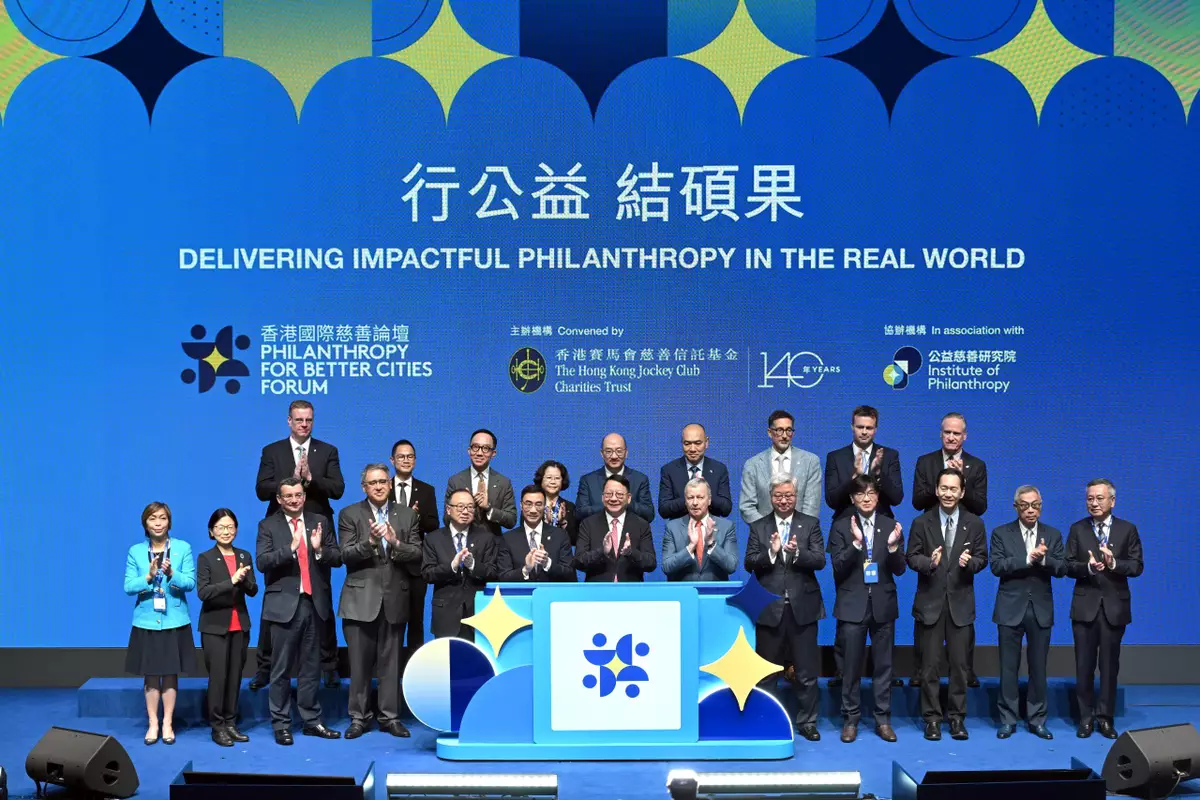
HKSAR Government Chief Secretary for Administration Chan Kwok-ki (front row, centre), Club Chairman Michael Lee (front row, 6th left), Club Deputy Chairman Martin Liao (front row, 5th left), Club Stewards, Club CEO Winfried Engelbrecht-Bresges (front row, 6th right) and Club management pose for a group photo at the opening ceremony of the Philanthropy for Better Cities Forum 2024.
The Club’s Charities Trust convened the forum in association with the Institute of Philanthropy (IoP), a charitable organisation launched by the Club and its Trust at the opening of the third PBC Forum in September 2023.
Through a video address at the forum, HKSAR Chief Executive John Lee said, “This forum is testament to Hong Kong’s commitment to philanthropy. It is proudly presented by The Hong Kong Jockey Club and its Charities Trust, a long-standing leader in championing our philanthropic endeavours.” He added, “The HKSAR Government is committed to Hong Kong’s rise as a global centre for philanthropy. That goal was formalised in our Policy Statement on Developing Family Office Businesses in Hong Kong. Our vision is to provide philanthropists with the tools they need to manage their wealth, while channelling their resources into social initiatives that create tangible impact. We are determined to realise Hong Kong as a go-to destination for global family offices passionate about making a difference.”
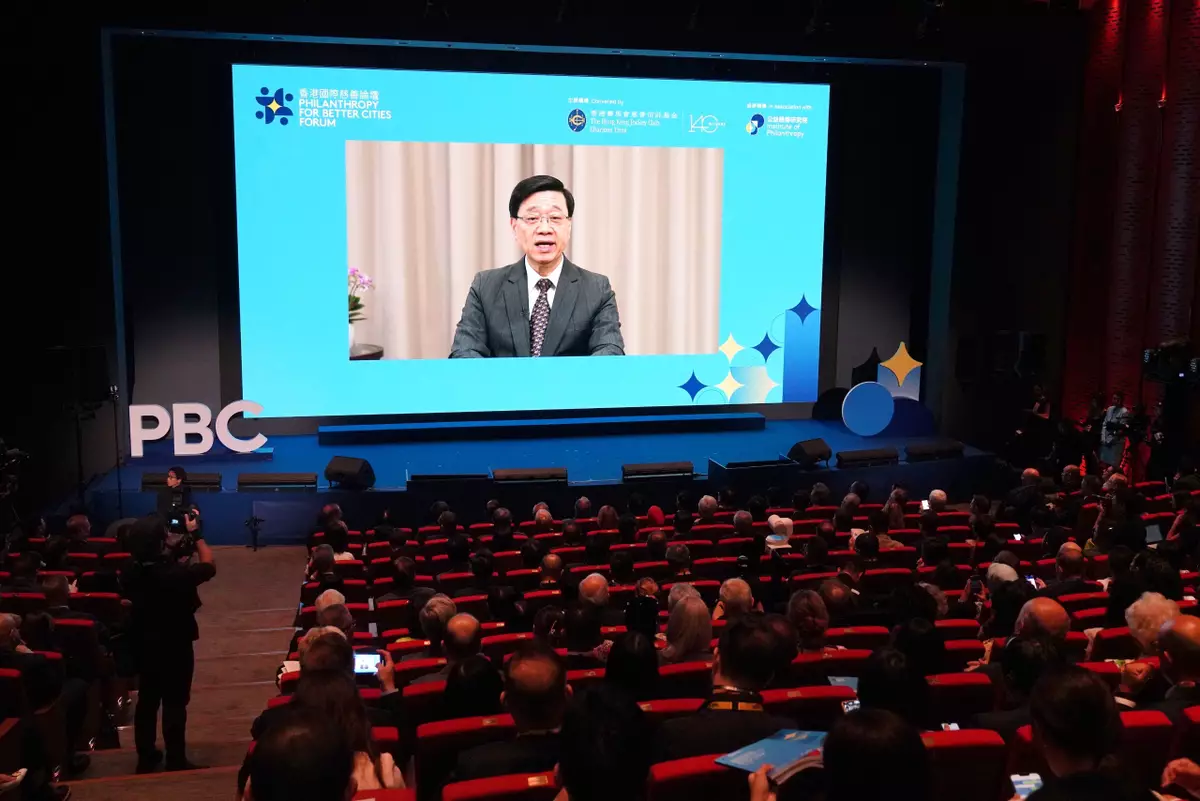
HKSAR Chief Executive John Lee delivers a video address at the opening ceremony of the Philanthropy for Better Cities Forum 2024.
Officiating at the opening ceremony of this year’s forum was HKSAR Government Chief Secretary for Administration Chan Kwok-ki, the Club’s Chairman Michael Lee and Club CEO Winfried Engelbrecht-Bresges.
In his welcome speech at the opening ceremony, the Club’s Chairman said, “In Asia – home to the most populous nations and fastest-developing economies – we are experiencing rapid growth in philanthropic giving commensurate with the region’s rising prosperity through development. However, Asian philanthropy requires properly contextualised models and solutions to account for varied political, economic and cultural contexts that are different from established, largely Western models. Unlocking its full potential will be crucial in addressing shared social and environmental challenges most effectively.”
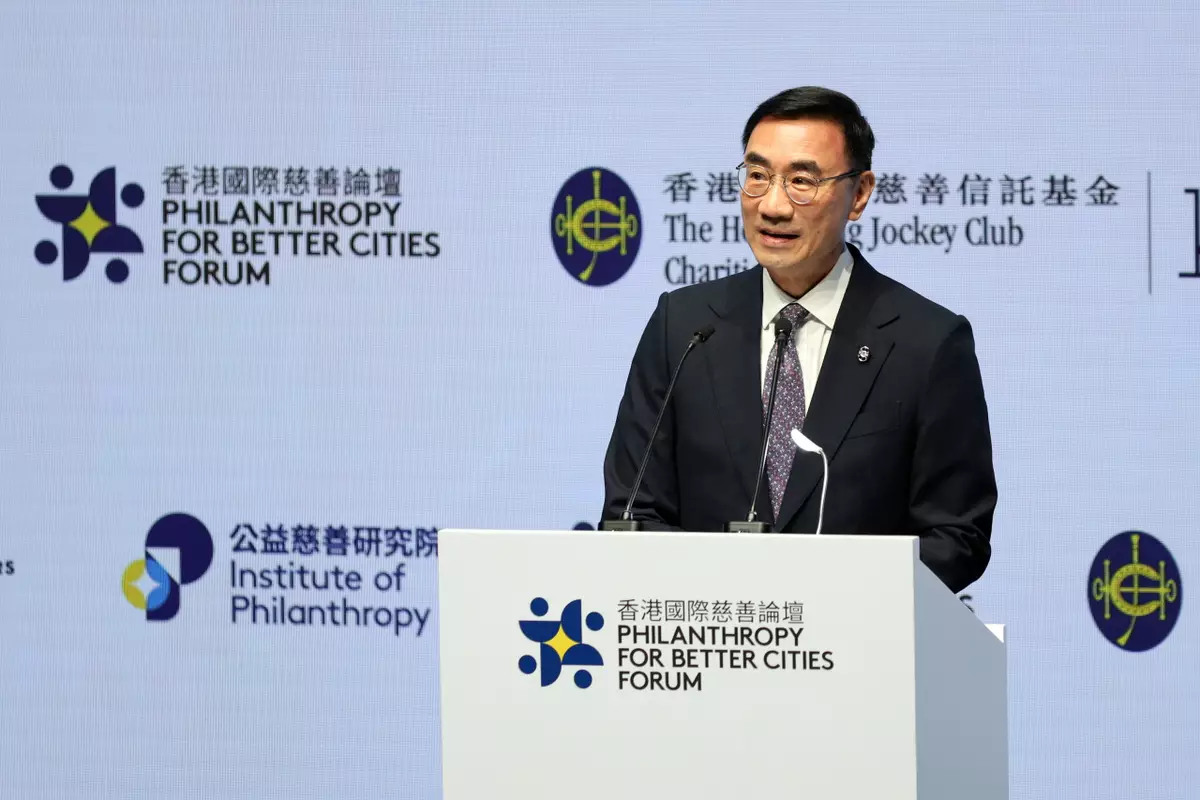
Club Chairman Michael Lee delivers a speech at the opening ceremony of the Philanthropy for Better Cities Forum 2024.
Leading foundations participating in this year’s PBC Forum include the Bill & Melinda Gates Foundation, China Soong Ching Ling Foundation, Nippon Foundation, Rockefeller Foundation, Tanoto Foundation, Temasek Foundation, Tencent Charity Foundation and the Wellcome Trust.
Julia Gillard – Chair of the Wellcome Trust, Chair of the Global Institute for Women’s Leadership and former Prime Minister of Australia – delivered today’s opening keynote entitled: “East is East and West is West: how does philanthropy differ and how can we best work together?”
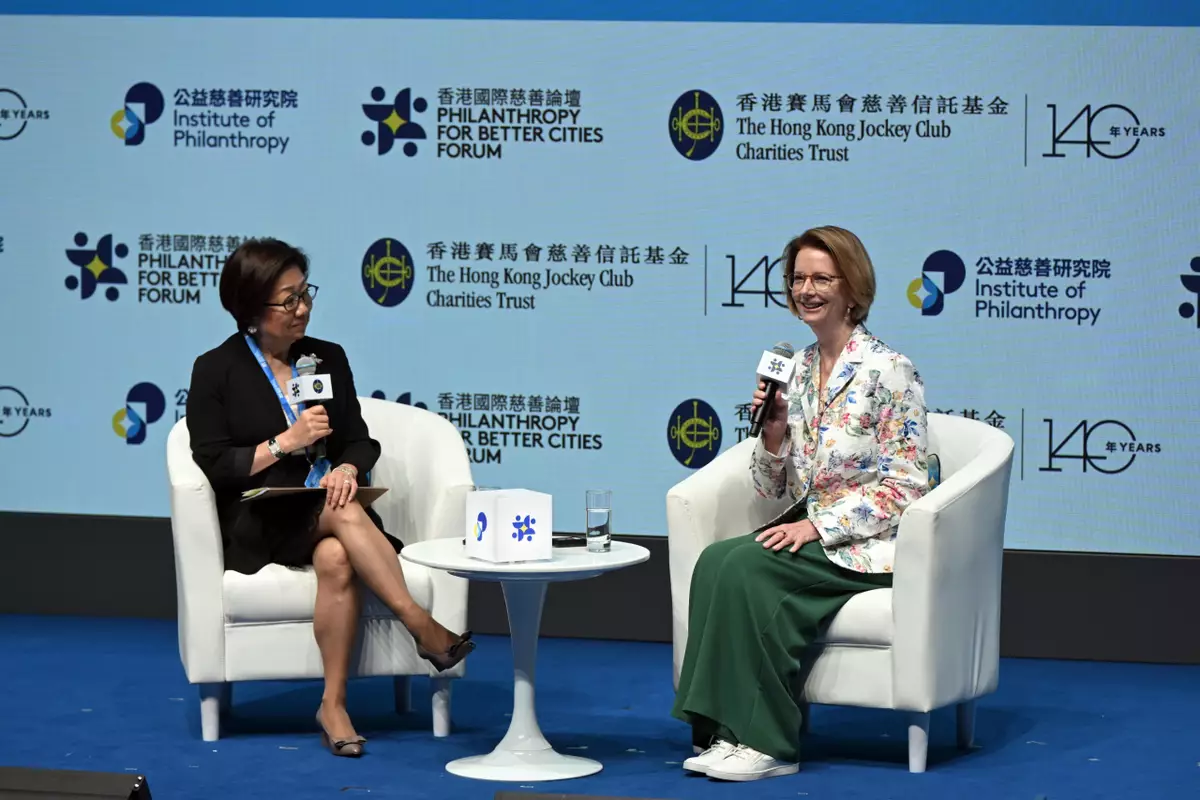
Moderated by Laura M. Cha, Trustee of the Rockefeller Foundation, Former Chairman of Hong Kong Exchanges and Clearing Ltd (left), Julia Gillard, Chair of the Wellcome Trust, Chair of the Global Institute for Women’s Leadership and former Prime Minister of Australia, (right) delivered the opening keynote: “East is East and West is West: how does philanthropy differ and how can we best work together?”
Professor Michael Spence – 2001 Nobel Laureate in Economics, Philip H. Knight Professor and Dean Emeritus of the Stanford Business School and Senior Fellow, Hoover Institution of Stanford University – delivered the second keynote entitled: “The economics of giving: what makes us give? What stops us from giving more?”
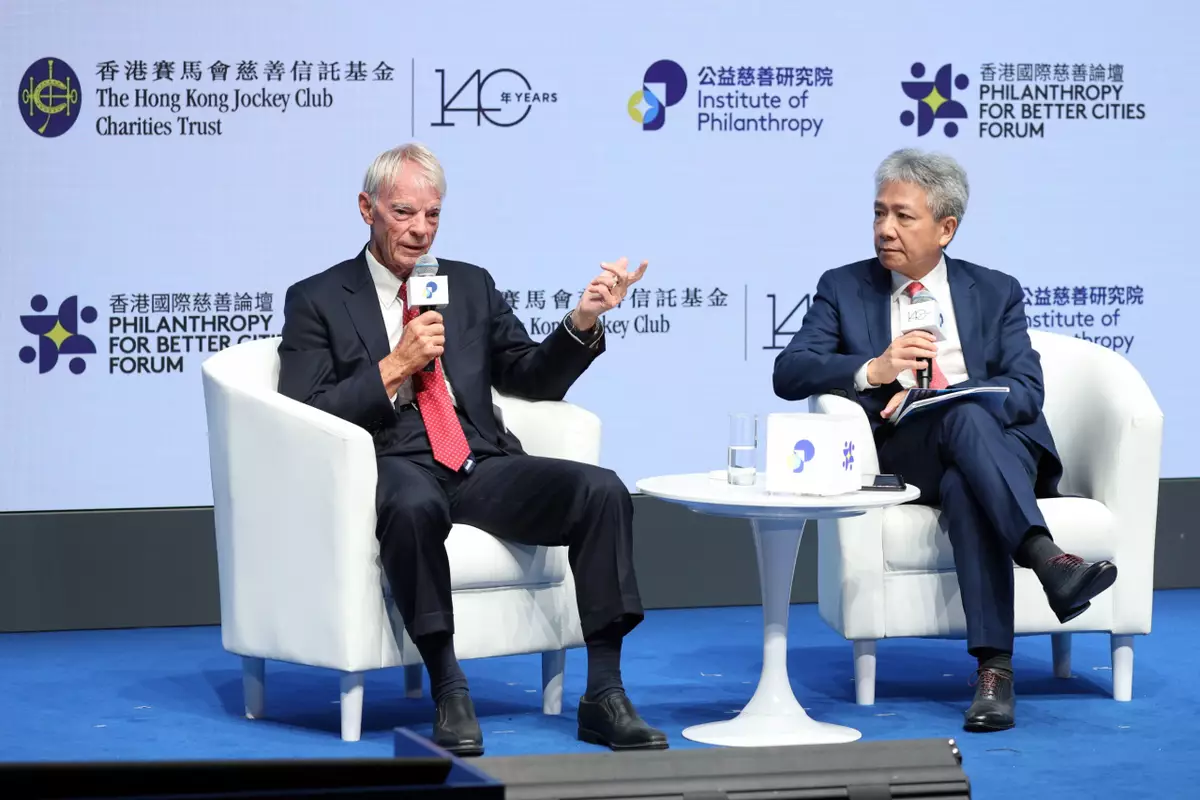
Delivering the second keynote entitled “The Economics of Giving: What makes us give? What stops us from giving more?” was Professor Michael Spence, 2001 Nobel Laureate in Economics, Philip H. Knight Professor and Dean Emeritus of the Stanford Business School and Senior Fellow, Hoover Institution of Stanford University (left). The moderator was Professor Stephen Cheung, Voting Member of The Hong Kong Jockey Club, Vice-Chairman of CMB Wing Lung Bank and Former President of the Education University of Hong Kong (right).
Additionally at the forum, representatives from the Department of Health of the HKSAR Government, the Club and IoP witnessed the signing of a Memorandum of Collaboration between the Chinese Center for Disease Control and Prevention and three local universities to strengthen capacity for monitoring and responding to epidemics in the Greater Bay Area. The local institutes are the Hong Kong Jockey Club Global Health Institute at the University of Hong Kong, the Jockey Club School of Public Health and Primary Care at the Chinese University of Hong Kong and the Jockey Club College of Veterinary Medicine and Life Science at the City University of Hong Kong. The memorandum follows the “One Health” approach which the Club has long supported including through the establishment of these university institutes.
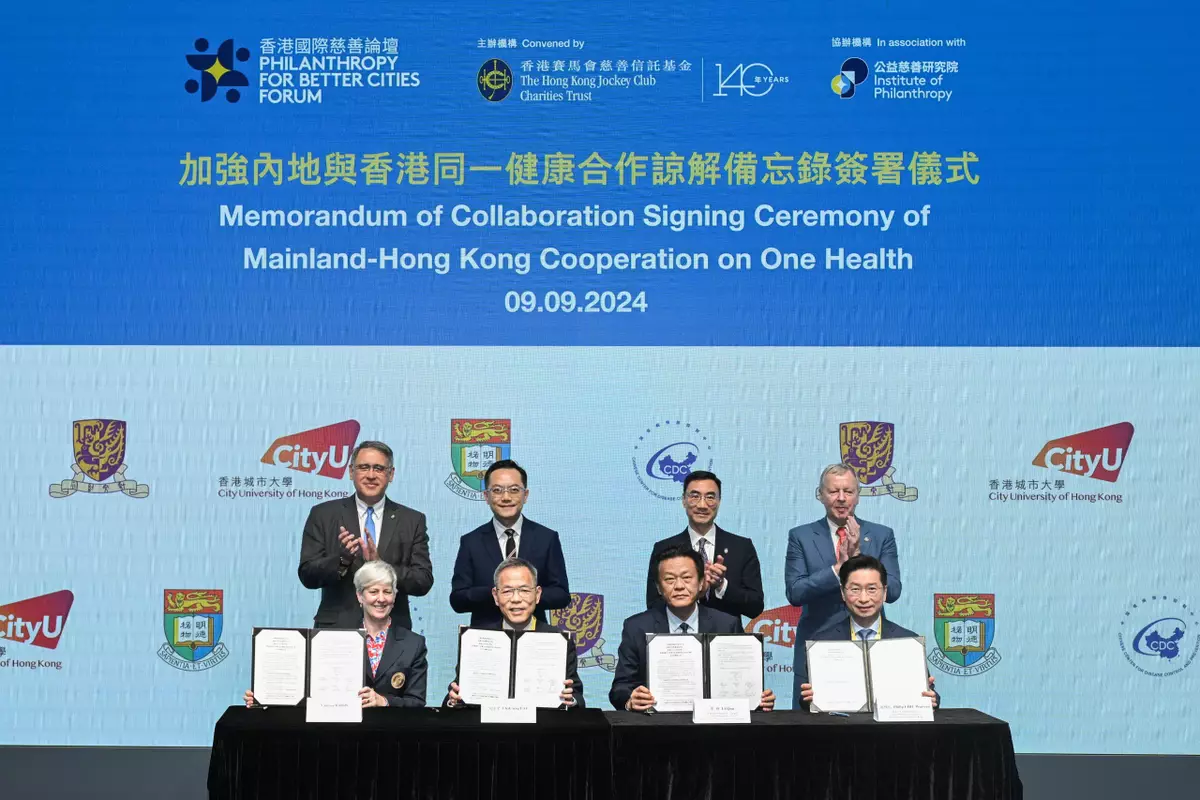
The Memorandum of Collaboration was signed by Li Qun, Deputy Director General, Chinese Center for Disease Control and Prevention (front row, 2nd right); Prof Chak-sing Lau, Dean of Medicine, The University of Hong Kong (front row, 2nd left); Prof Philip Chiu Wai-yan, Dean of Medicine, The Chinese University of Hong Kong (front row, 1st right); and Prof Vanessa Barrs, Dean, Jockey Club College of Veterinary Medicine and Life Sciences, City University of Hong Kong (front row, 1st left). The signing ceremony was witnessed by Michael Lee,Chairman of The Hong Kong Jockey Club (back row, 2nd right); Lester Huang, Chairman of IoP and Steward of The Hong Kong Jockey Club (back row, 1st left); Winfried Engelbrecht Bresges, CEO of The Hong Kong Jockey Club and Director of IoP (back row, 1st right); and Dr Ronald Lam, Director of Health, HKSAR Government (back row, 2nd left).
This year the forum programme spans five days. It began with a welcome luncheon at the opening of Hong Kong’s 2024/25 horseracing season on 8 September, followed by the two day forum. The Foundations Circle and additional side-events will be convened by IoP on 11 and 12 September. In addition, the Hong Kong Academy for Wealth Legacy will also host a three-day summit from 12-14 September, rounding out Hong Kong Philanthropy Week.
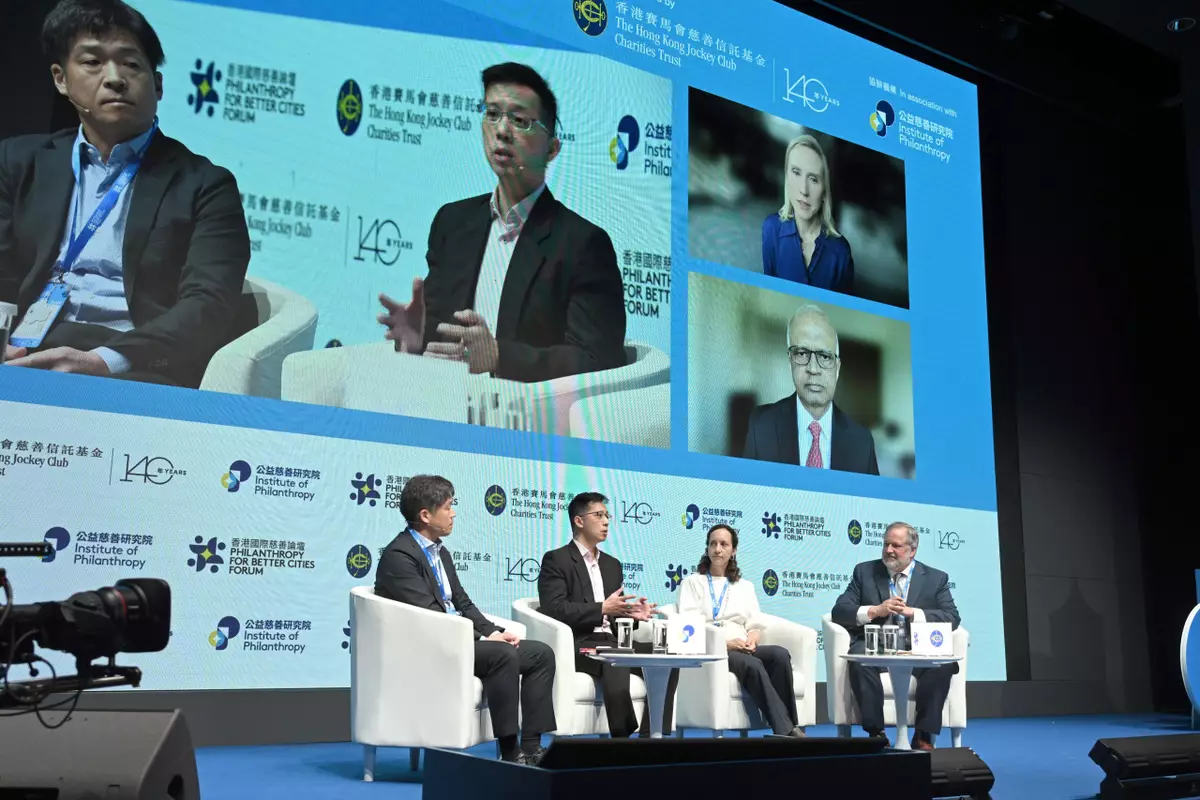
Launching a new, systematic assessment of Asian giving”, Ichiro Kabasawa, Executive Director of The Nippon Foundation (1st left), Benny Lee, CEO of the Tanoto Foundation (2nd left), and Jennifer Stout, Deputy Director of the Bill & Melinda Gates Foundation (2nd right), explore the potential of new assessment tools to define and ensure philanthropic impact. The session was moderated by William Foster, Managing Partner of the Bridgespan Group (1st right). Jagannatha Kumar, Chief Executive Officer of Reliance Foundation, and Mattie Bekink, China Regional Director of the Ford Foundation, also participated in the discussion via video conferencing.
The Club’s support for the PBC Forum, like all of its charity and community initiatives, is made possible by its unique integrated business model through which racing and wagering generate tax contributions, charity support and employment opportunities for the community.

In the first plenary session entitled “What is Impact? The second plenary session entitled “Innovations for a Healthier Global South: What is the role of philanthropy in supporting global health research and interventions?” was moderated by Professor Margaret Chan, Founding Dean of the Vanke School of Public Health, Tsinghua University, and Emeritus Director General of World Health Organization (1st right). It featured Rebecca F. Grais, Executive Director of the Pasteur Network (1st left); Ilona Kickbusch, Director of Digital Health Transformations LAB, University of Geneva, Chair and Founder of the Global Health Center Geneva at the Graduate Institute Geneva and Co-chair of the Council of the World Health Summit (2nd left); Professor Peter Piot, Professor of Global Health, London School of Hygiene & Tropical Medicine, Special Advisor to European Commission President von der Leyen on European and Global Health Security (3rd left); Naveen Rao, Senior Vice-President of the Health Initiative at the Rockefeller Foundation (3rd right); and Carsten Schicker, Chief Executive Officer of the World Health Summit (2nd right).
To encourage everyone to lend a helping hand, The Hong Kong Jockey Club Charities Trust initiated and funded the JC VOLUNTEER TOGETHER starting from 2022. This includes support for the Hong Kong Volunteer Award, which recognises the many eople who have contributed to the betterment of our society.
Today (10 December) saw the presentation of this year’s Hong Kong Volunteer Award, co-organised by the Home and Youth Affairs Bureau and the Agency for Volunteer Service. Officiating guests included Warner Cheuk, HKSAR Government Deputy Chief Secretary for Administration; Clarence Leung, HKSAR Government Acting Secretary for Home and Youth Affairs; Tian Guiyu, Deputy Director of Department of Social Affairs, Liaison Office of the Central People’s Government in the HKSAR; Lester Huang, Steward of The Hong Kong Jockey Club; and Melissa Kaye Pang, Chairman of Agency for Volunteer Services.
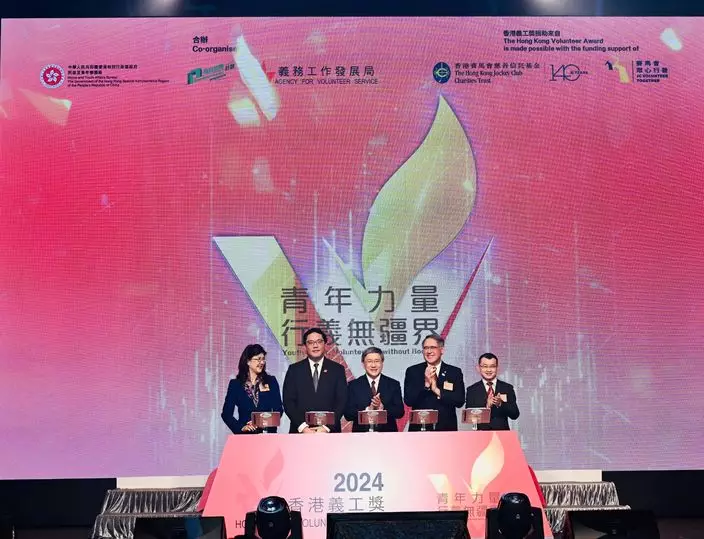
Warner Cheuk, HKSAR Government Deputy Chief Secretary for Administration (centre); Clarence Leung, HKSAR Government Acting Secretary for Home and Youth Affairs (2nd left); Tian Guiyu, Deputy Director of Department of Social Affairs, Liaison Office of the Central People’s Government in the HKSAR (1st right); Lester Huang, Steward of The Hong Kong Jockey Club (2nd right); and Melissa Kaye Pang, Chairman of the Agency for Volunteer Services (1st left) officiate at the Hong Kong Volunteer Award 2024 presentation ceremony.
Club Steward Lester Huang said the Club has been closely collaborating with the Agency for Volunteer Service since the 1970s to promote volunteering. Last year, through JC VOLUNTEER TOGETHER, the Club supported new awards under the Hong Kong Volunteer Award scheme to recognise volunteers from different sectors and backgrounds. Moving forward, the Club will continue to launch volunteer projects designed to encourage more people to volunteer and to help people in need.
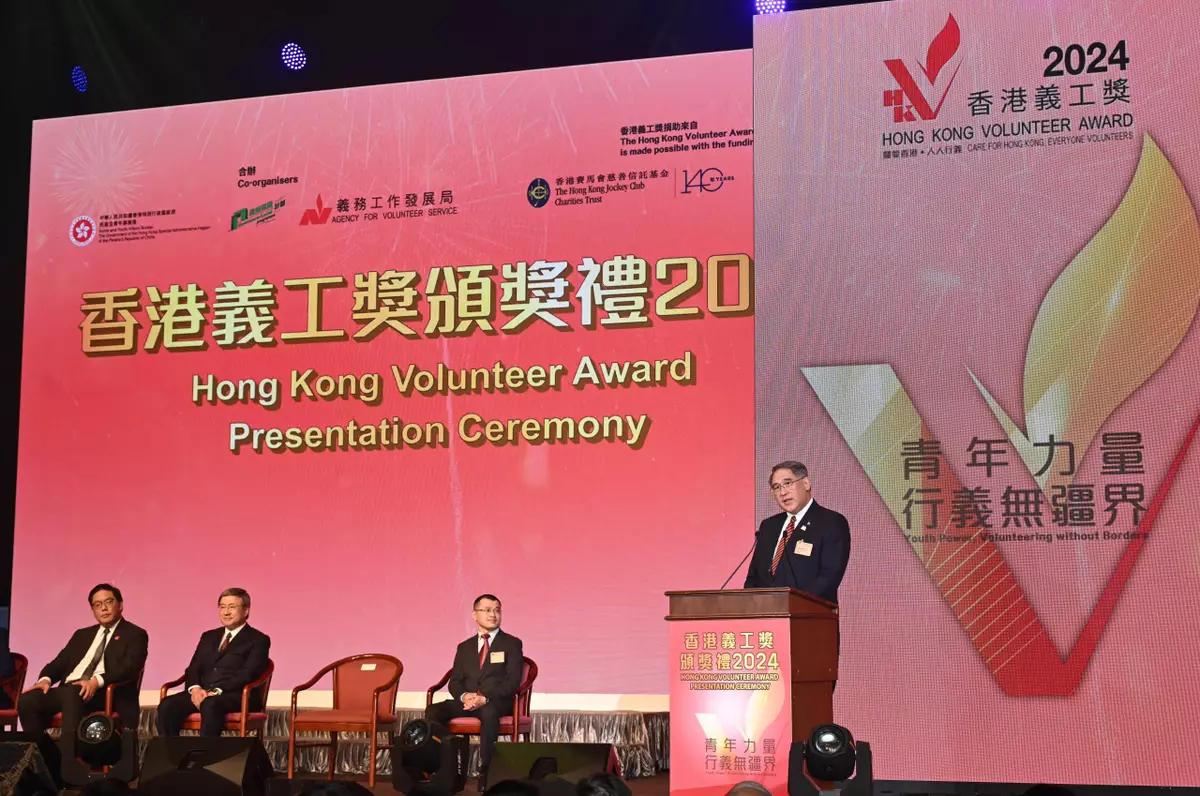
Lester Huang, Steward of The Hong Kong Jockey Club, delivers a speech at the HongKong Volunteer Award 2024 presentation ceremony.
Since last year, the Club has supported awards under the Hong Kong Volunteer Award scheme through its JC VOLUNTEER TOGETHER initiative. The awards include theJC VOLUNTEER TOGETHER Outstanding Evergreen Volunteer Award, the JC VOLUNTEER TOGETHER Outstanding Caring School Award, the JC VOLUNTEER TOGETHER Evergreen Volunteer Award (Volunteer Hours) and the JC VOLUNTEER TOGETHER Top 10 Caring School, all of which celebrate exceptional volunteering efforts. The Club is also supporting the JC VOLUNTEER TOGETHER Outstanding Rising Star Volunteer Award, which recognises people who are volunteering for the first time or returning to volunteering for their achievement and contribution.
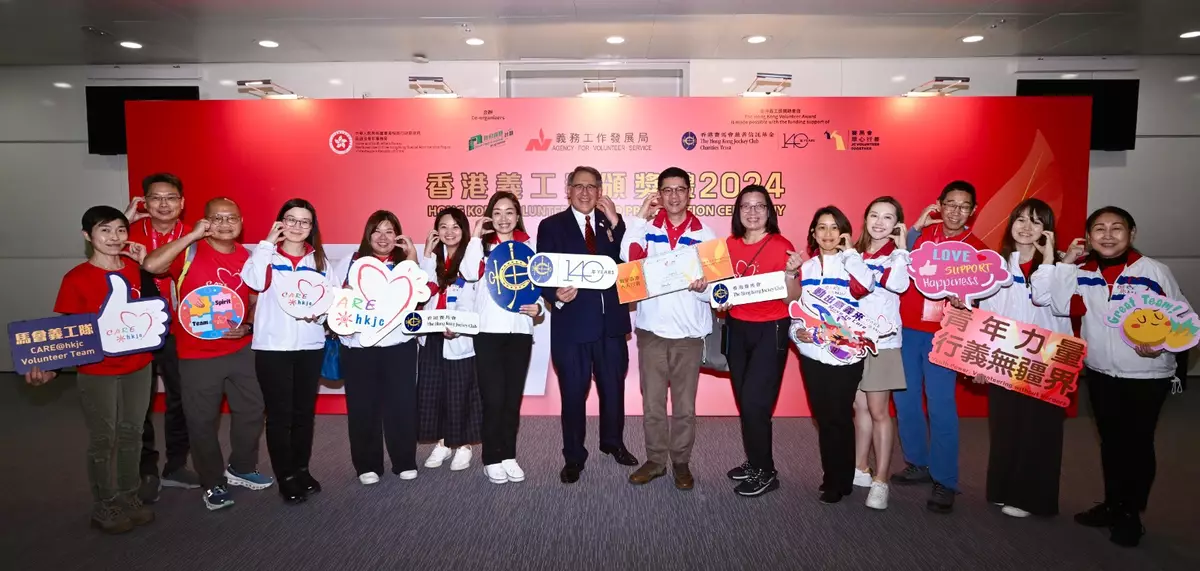
Lester Huang, Steward of The Hong Kong Jockey Club (centre), and Freely Cheng, the Club’s Head of External Affairs (7th right), with members of the CARE@hkjc Volunteer Team.
The Club has always been a strong supporter of volunteering. In addition to the volunteer awards supported by its Charities Trust, the Club has its own CARE@hkjc Volunteer Team, comprising employees who actively help out in the community. In 2023, the Club’s volunteer team contributed over 23,000 volunteering hours, positively impacting more than 670,000 people. At this year’s Hong Kong Volunteer Award, The Hong Kong Jockey Club was awarded an Outstanding Corporate Award, Corporate & Non-Commercial Organisation (Volunteer Hours) Top Ten Highest Volunteer Hour, and Corporate & Non-Commercial Organisation (Volunteer Hours) Gold Award in recognition of the achievements of the CARE@hkjc Volunteer Team.
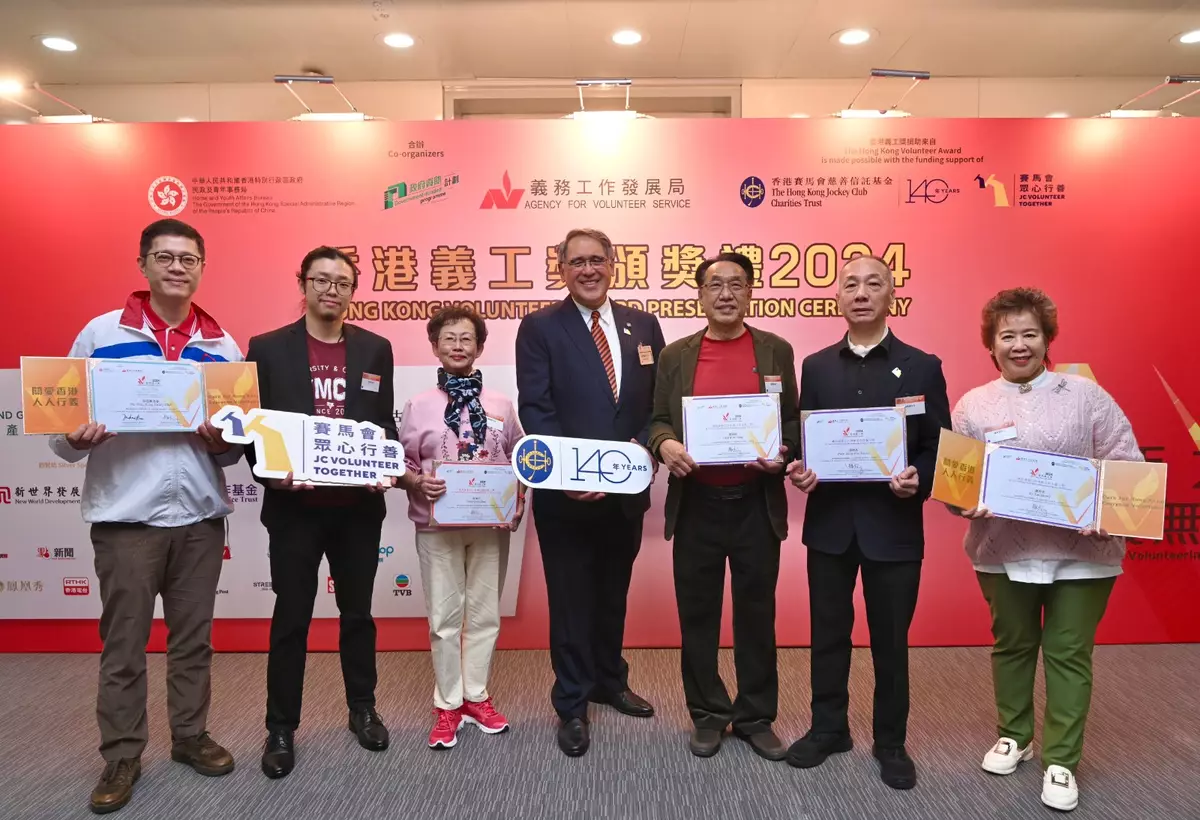
Lester Huang, Steward of The Hong Kong Jockey Club (centre), and Freely Cheng, the Club’s Head of External Affairs (1st left), with recipients of the JC VOLUNTEER TOGETHER Outstanding Evergreen Volunteer Award and the Outstanding Rising Star Volunteer Award.
Further details can be found on the Hong Kong Volunteer Award website: https://www.hkv-award.hk/
JC VOLUNTEER TOGETHER, initiated and funded by The Hong Kong Jockey Club Charities Trust, was launched in collaboration with 12 partner organisations. It is designed to encourage and mobilise primary and secondary school students, families, working adults, people aged 50+ and retirees as well as the general public to do good for the community. It has also created the JC VOLUNTEER TOGETHER PLATFORM to help people identify volunteering opportunities, and register for and keep track of their volunteering activities.
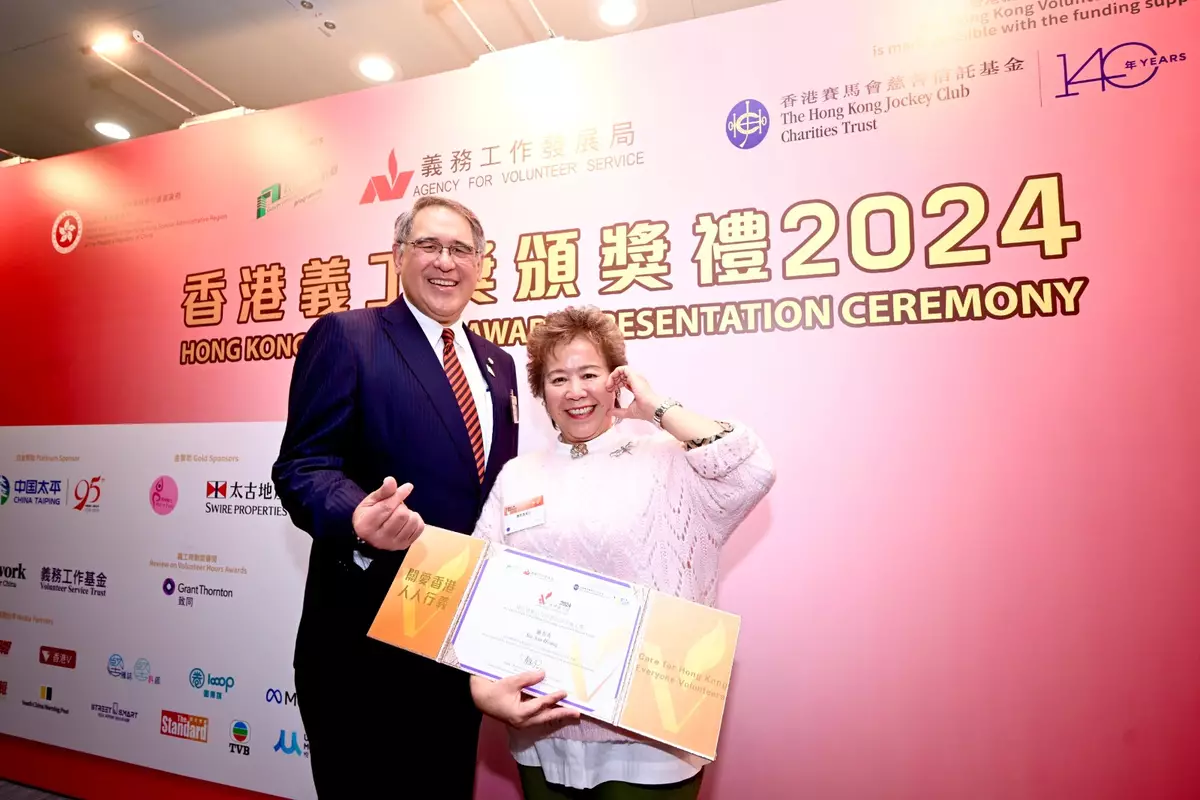
Lester Huang, Steward of The Hong Kong Jockey Club (left), and JC VOLUNTEER TOGETHER Outstanding Evergreen Volunteer Awardee Kitty Siu.
The Club’s support for the JC VOLUNTEER TOGETHER, like all its charity donations,is made possible by its unique integrated business model through which racing andwagering generate tax contributions, charity support and employment opportunities forthe community.
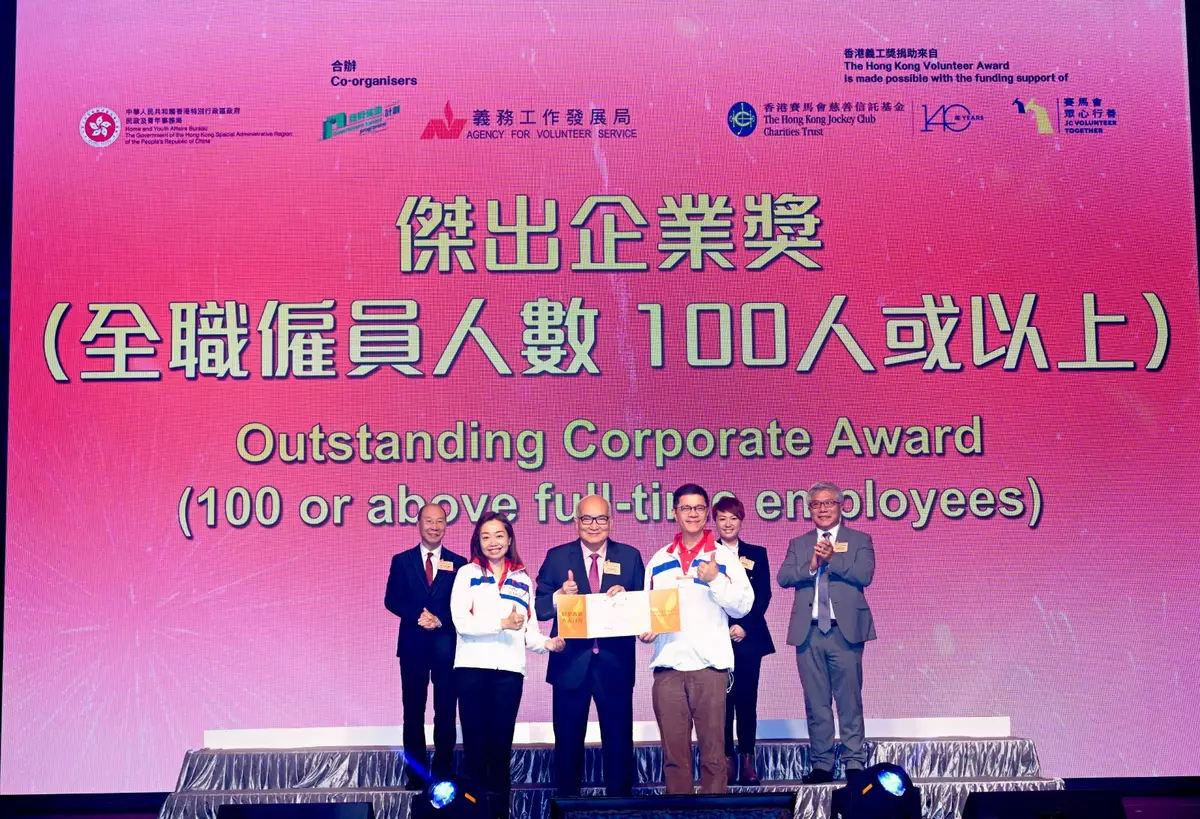
The Hong Kong Jockey Club was honoured with an Outstanding Corporate Award,Corporate & Non-Commercial Organisation (Volunteer Hours) Top Ten Highest olunteer Hour, and Corporate & Non-Commercial Organisation (Volunteer Hours)Gold Award.
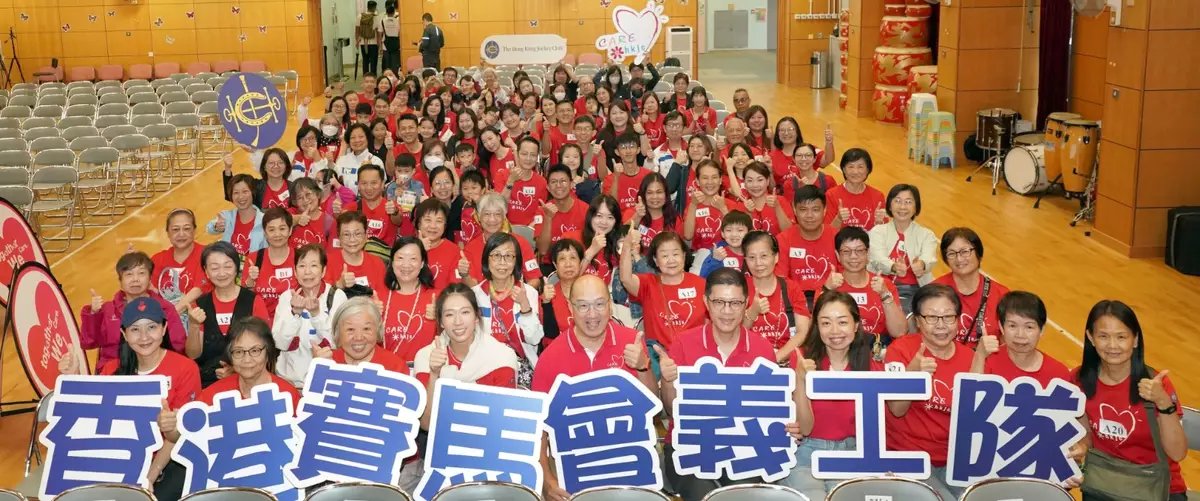
The Club’s CARE@hkjc Volunteer Team comprises employees who actively help out in the community.










